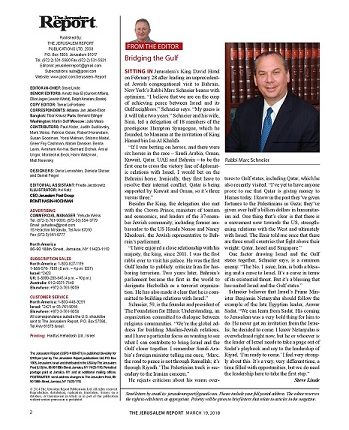
The Jerusalem Report
March 19, 2018

From the Editor: Steve Linde
SITTING IN Jerusalem’s King David Hotel on February 28 after leading an unprecedented Jewish congregational visit to Bahrain, New York’s Rabbi Marc Schneier beams with optimism. “I believe that we are on the cusp of achieving peace between Israel and its Gulf neighbors,” Schneier says. “My guess is it will take two years.” Schneier and his wife,
Simi, led a delegation of 18 members of the prestigious Hampton Synagogue, which he founded, to Manama at the invitation of King Hamad bin Isa Al Khalifa.
“If I was betting on horses, and there were six horses in the race – Saudi Arabia, Oman, Kuwait, Qatar, UAE and Bahrain – to be the first one to cross the victory line of diplomatic relations with Israel, I would bet on the
Bahraini horse. Ironically, they first have to resolve their internal conflict. Qatar is being supported by Kuwait and Oman, so it’s three versus three.”
Besides the King, the delegation also met with the Crown Prince, ministers of tourism and economics, and leaders of the 37-member Jewish community, including former ambassador to the US Houda Nonoo and Nancy Khedouri, the Jewish representative to Bahrain’s parliament.
“I have enjoyed a close relationship with his majesty, the king, since 2011. I was the first rabbi ever to visit his palace. He was the first Gulf leader to publicly criticize Iran for harboring terrorism. Two years later, Bahrain’s
parliament became the first in the world to designate Hezbollah as a terrorist organization. He has also made it clear that he is committed to building relations with Israel.”
Schneier, 59, is the founder and president of The Foundation for Ethnic Understanding, an organization committed to dialogue between religious communities. “We’re the global address for building Muslim-Jewish relations, and I have a particular focus on wanting to see what I can contribute to bring Israel and the Gulf closer together. I remember Saudi Arabia’s foreign minister telling me once, ‘Marc, the road to peace is not through Ramallah; it’s through Riyadh.’ The Palestinian track is secondary to the Iranian concern.”
He rejects criticism about his warm over tures to Gulf states, including Qatar, which he also recently visited. “I’ve yet to have anyone prove to me that Qatar is giving money to Hamas today. I know in the past they’ve given fortunes to the Palestinians in Gaza; they’ve given over half a billion dollars in humanitarian aid. One thing that’s clear is that there is a movement now towards the US, strengthening relations with the West and ultimately with Israel. The Emir told me once that there are three small countries that fight above their weight: Qatar, Israel and Singapore.”
One factor drawing Israel and the Gulf states together, Schneier says, is a common enemy. “The No. 1 issue, Iran, is both a blessing and a curse to Israel. It’s a curse in terms of its existential threat. But it’s a blessing that
has united Israel and the Gulf states.”
Schneier believes that Israel’s Prime Minister Benjamin Netanyahu should follow the example of the late Egyptian leader, Anwar Sadat. “We can learn from Sadat. His coming to Jerusalem was a very bold thing for him to do. He never got an invitation from the Israelis; he decided to come. I know Netanyahu is overwhelmed right now, but he or whoever is the leader of Israel needs to take a page out of Sadat’s playbook and say to the leadership of Riyad, ‘I’m ready to come.’ I feel very strongly about this. It’s a very, very different time, a time filled with opportunities, but we do need the leadership here to take the first step.”
Copyright © 2025 Foundation For Ethnic Understanding. All rights reserved. | Privacy Policy